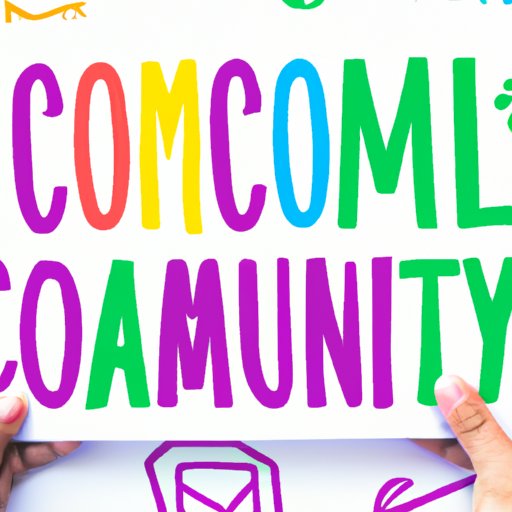The Importance of a Community: How Feeling Connected Can Improve Your Life and Your Surroundings
Communities are an essential part of human life. Whether we’re talking about small, tight-knit neighborhoods or sprawling urban areas, people rely on their communities to help them feel a sense of belonging, connection, and safety. Indeed, research has shown that individuals who feel connected to others in their community are overall happier and healthier than those who do not.
In this article, we’ll explore why a strong sense of community is crucial for individuals and communities as a whole. We’ll cover the benefits of a strong community, ways communities can better support individuals in times of need, the economic benefits of a healthy community, and how community engagement and initiatives can play a role in building a stronger and more connected community.
The Benefits of a Strong Sense of Community
Studies have shown that individuals who feel connected to their community are overall happier and healthier. One study conducted at Brigham Young University found that people who reported having strong social connections had a lower risk of premature death than those who did not. This research also found that people who feel connected to their community were less likely to experience health problems such as heart attacks, strokes, and depression.
Moreover, a strong sense of community also has psychological benefits. When individuals feel connected within their neighborhood, they have a sense of belonging, identity, and purpose. They also feel more supported, which can decrease rates of anxiety and depression.
In addition to the psychological and health benefits, a strong sense of community can positively impact areas such as safety and general well-being. Communities with strong social connections often experience lower levels of crime and vandalism. They also have stronger collective action abilities, making them better equipped to manage disasters or handle issues that impact their community.
How Communities Can Better Support Individuals in Times of Need
A strong sense of community provides individuals with emotional, physical, and practical support when they need it. Neighborly support during challenging times can make a significant difference in someone’s life. In times of need, a neighbor may offer to care for a sick child or provide food during tough financial times. This support can provide individuals with a greater sense of security and ease.
Interviews with community members who have experienced the support of their community during challenging times can attest to its importance. The willingness of a community to pull together in difficult times creates a shared strength that helps to build a better sense of community. Through work together, people can trust that support comes not only from family members but from all those who live nearby.
Economic Benefits of a Strong and Healthy Local Community
A strong and healthy local community brings economic benefits to the area. Areas with an excellent quality of life attract and retain businesses and industry, which contributes to a thriving local economy. Employers are more likely to invest in areas with a stable population with strong social connections. Also, a stronger sense of community helps to create a higher retention rate among employees. This retention is because employees are happier to stay and work where they feel connected to others in their community.
To understand the positive economic impact of a strong sense of community better, it’s helpful to interview local business owners who have chosen to stay and invest in the community. People may cite the sense of place and community as well as the proximity of other small businesses as among the reasons they chose to invest in the area.
The Impact of Community Organizations, Clubs, and Groups
Community organizations, clubs, and groups provide an excellent way for individuals to connect and make meaningful relationships with others who share common interests. Moreover, they are essential for helping to build a strong and interconnected community. Local sports teams, volunteer organizations, or even book clubs each play a role in bringing people together and creating a vibrant sense of community.
For example, sports teams bring together people from different backgrounds to create a sense of community and shared success. Volunteer organizations allow people to give back to their community and support those in need. Book clubs are a fabulous way to create cherished relationships by reading and discussing books in person. Whatever aspect of life these organizations relate to are a way to form meaningful relationships with others.
Community Engagement
Engagement in a community is an essential part of building a strong sense of community. Individuals who involve themselves in events and issues within their community feel a greater sense of connection. Such individuals are more likely to take action to preserve their community’s way of life by getting involved in civic and political action, voting on issues of significance in their community and attending local government meetings. Community leadership is key to encouraging such actions and making sure community members feel like they have a voice.
Community-Led Initiatives and Projects
Community-led initiatives and projects offer fantastic opportunities for residents to work together and create shared spaces and events. These initiatives can create a sense of ownership and independence across the community. Such projects include community gardens, neighborhood cleanup initiatives, and local green spaces. These initiatives provide opportunities for residents to connect, learn, and protect their environment together, creating an even stronger sense of community.
Conclusion
In summary, a strong sense of community can have numerous benefits for individuals and communities as a whole. From psychological benefits to improved economic health, a strong sense of community provides individuals with connections, security, and better health. Communities that prioritize supporting individuals in times of need, connecting people in meaningful ways such as through organizations and clubs, and encouraging community engagement can foster stronger connections and create vibrant, thriving areas. By doing so, residents can make positive changes in their own lives, while also improving their surrounding neighborhoods for everyone.
